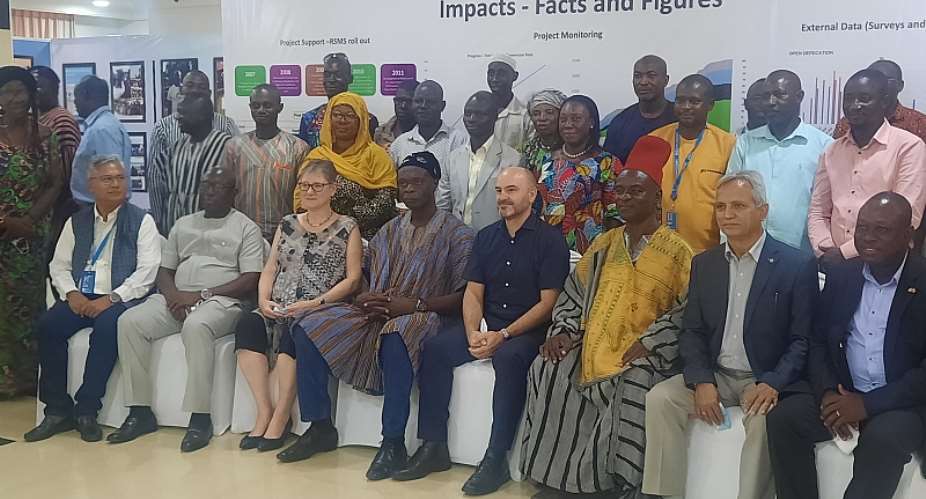A total of 1,188 rural communities and 35 small towns in eight regions have achieved Open Defaecation Free (ODF) status giving 368,153 children and their families excreta free environment to live and thrive.
This feat has been achieved following the construction of 44,109 household toilets while 496,781 people have also adopted the practice of handwashing with soap in those areas.
At the institutional level, over 349 schools, and over 80 health care facilities in the regions have been supported with improved toilets and water supply while 107,000 schoolchildren have also been reached with Water, Sanitation and Hygiene (WASH).
These results have been achieved following the implementation of the Enhanced WASH, and Accelerated Sanitation projects from 2012 to 2020 in the Northern, North East, Savannah, Upper East, Upper West, Volta, Oti and Central Regions.
The projects, implemented by the United Nations Children’s Fund (UNICEF) with support from Canada, sought to touch lives locally while responding to global benchmarks such as the Sustainable Development Goals as well as to create opportunities for people to have access to basic WASH services.
Ramesh Bhusal, Chief of WASH, UNICEF, who presented the results in Tamale during the close-out event on the Enhanced WASH, and Accelerated Sanitation projects, said 67,000 schoolchildren were empowered to advocate for improved WASH in their schools and communities while 39,000 girls were trained on menstrual hygiene management.
He added that there was capacity building for over 1,100 teachers on hygiene education including menstrual hygiene management while 1,206 health staff had had their capacity built to promote hand hygiene.
He said the project had transformed the WASH sector in the regions, which led to a reduction in open defaecation especially in the five regions in the north from an average of 75 per cent in 2012 to an average of 25% in 2020.
Mr Fiachra McAsey, Deputy Representative, UNICEF, Ghana said the projects had a significant impact in building institutional capacity and improving enabling environment for sustaining and replicating the work done.
He added that the projects also significantly strengthened the private sector’s role in WASH sector by promoting engagement of small business, local artisans and village level technicians.
He said “Low level of public financing is one of the critical areas that the WASH sector has been facing in Ghana. The project has not only introduced result-based financing to make best use of the limited resources in sanitation sub-sector but also introduced innovative revolving loan scheme to leverage household financing their own facilities.”
Mr McAsey, therefore, highlighted the need for the government to establish the long-awaited National Sanitation Authority and the National Sanitation Fund to ensure that the sector received adequate priority and support.
He also called for increased public sector funding for WASH from the current level of less than 0.1% of Gross Domestic Product (GDP) to at least 0.5% of GDP as committed to by the government in the Ngor Declaration.
Ms Louise Paris, Deputy Director of Operations, Global Affairs Canada said “Canada is confident that the Government of Ghana at both National, Regional and District levels will continue to deepen the footprint of Enhanced WASH and Accelerated Sanitation. It will be great to see the expansion of these services to more communities, and particularly the many women and girls for whom they make a huge difference.”
Alhaji Shani Alhassan Saibu, Northern Regional Minister commended partners for their support, which had led to improved WASH practices in the region as well as helping to ensure retention of girls in schools while improving health outcomes for especially women and children.
Ubor Wumbe Dawuni, Chief of Bunbong in the Yendi Municipality lauded the Enhanced WASH and Accelerated Sanitation projects for helping his community to attain the ODF status saying “now, our destiny is in our own hands. As opinion leaders, we will keep pushing by talking to our people to continue to use their toilets” urging the Yendi Municipal Assembly to continue to invest in WASH to attain improved sanitation across the area and sustain the gains.






 No need to tax churches – Bawumia
No need to tax churches – Bawumia
 Voter registration: NPP rebukes NDC over request for serial numbers of BVR kits
Voter registration: NPP rebukes NDC over request for serial numbers of BVR kits
 Parliament to summon VRA for failing to dredge Volta estuary for years
Parliament to summon VRA for failing to dredge Volta estuary for years
 Stop the desires for coup d'état — Ghanaians told
Stop the desires for coup d'état — Ghanaians told
 Manhyia Palace bans Tricycle riders on Sunday to climaxes Otumfuo's 25th anniver...
Manhyia Palace bans Tricycle riders on Sunday to climaxes Otumfuo's 25th anniver...
 Blame Supreme Court for limited voter registration challenges – George Opare Add...
Blame Supreme Court for limited voter registration challenges – George Opare Add...
 Excessive partisanship breeds madness — Prof Gyampo on NPP’s defence of cedi dep...
Excessive partisanship breeds madness — Prof Gyampo on NPP’s defence of cedi dep...
 PDS scandal: ‘The totality of Ghana’s loss is the ‘dumor’ being experienced toda...
PDS scandal: ‘The totality of Ghana’s loss is the ‘dumor’ being experienced toda...
 677,140 births and 50,992 deaths recorded in 2022 - Statistical Report
677,140 births and 50,992 deaths recorded in 2022 - Statistical Report
 Ghana’s electoral commission is one that trusts thieves — Omane Boamah
Ghana’s electoral commission is one that trusts thieves — Omane Boamah
